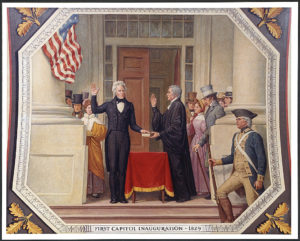Interview by Barbara Noe Kennedy

BGES Blog: Give us the three-sentence description of your tour.
Neil Mangum: Andy Jackson and the Creek War and the Battle of New Orleans comprise the foundation of this historical tour. We follow Jackson’s mercurial rise as a general and his utter destruction of the Creek Nation, culminating with his brilliant victory at the Battle of New Orleans. But the tour is significant in other ways, as it traces the tragic story of the Creek Nation, which in the end surrenders 23 million acres of its homeland, resulting in its forced removal to Indian Territory in the 1830s. Fo Jackson the successful campaigns become a catapult for a promising political career that lands him in the White House in 1829.
BGES Blog: Why was Andrew Jackson so intent on avenging his hatred of the British?
Neil Mangum: Jackson’s relationship with the British was never very good. As a reminder, Jackson wore a scar on his cheek made by the blade of a British officer’s sword after the young Jackson refused to polish the officer’s boots. As the American frontier expanded westward, Jackson believed that the British were the primary cause of many of the Indian dissatisfactions and accused the British of arming the Indians to attack nearby white settlements. He held the British in contempt and likewise the Spanish who controlled Florida with British assistance.
BGES Blog: Why was the Battle of Horseshoe Bend against the Creek Indians in 1814 so decisive?
Neil Mangum: Jackson’s victory at Horseshoe Bend brought to a close the Creek Indian War. It resulted in the Creek’s surrendering 23 million acres of Creek land to the southeastern United States, roughly three-fifths of Alabama and one-fifth of Georgia. It put Jackson on a road to national fame paved nine months later by his brilliant victory over the British at New Orleans. For the Creeks, Horseshoe Bend represented a continued breakdown of cultural identity and permanent loss of their homeland.
BGES Blog: What was the key to the Americans’ victory at the Battle of New Orleans in 1815?
Neil Mangum: There are many keys to Jackson victory over the British at New Orleans. Although his army was smaller than the British, Jackson had selected an ideal place for defending the Crescent City. His troops occupied a position with flanks resting on the Mississippi River and on a swamp. In between the flanks Jackson positioned his artillery behind a stout rampart wall of mud overlooking an old sugar cane field. The British attack would have to come directly across the field into the teeth of Jackson’s defense. The British foolishly obliged Jackson by charging across the open fields. The battle lasted more than two hours, but the major fighting consumed little more than 30 minutes, of which 2,000 British troops were casualties. American casualties numbered around 20. Much of the credit for the victory goes to Jackson. But there were other heroes, too. Jackson’s volunteers deserve a great deal of credit for they stubbornly resisted against the British army, considered by many to be the elite Army of the world. Jackson’s little army came from the backwoods of Tennessee and Kentucky. Some of them were pirates from the Barataria islands of Louisiana led by the Laffite brothers. The rank-and-file included French Creoles, free men of color, Choctaw Indians, and regular United States Infantry.
BGES Blog: Was Andrew Jackson a tyrant or man of the people?
Neil Mangum: Depending on your point of view, Jackson could easily be categorized as a tyrant. However, to his supporters, and he had many, he represented that self-made frontiersman who championed the small-time farmers. Jackson had risen from tough Scotch-Irish stock. He became one of the dominant planters in Middle Tennessee. Jackson was a tough-minded politician. To his enemies he was implacable. When angered, he possessed a fiery temper and a caustic tongue that poured forth a litany of curse words. To Jackson’s enemies he was vindictive and unyielding. And to his most bitter enemies, that anger could spill over into a duel.
Among Jackson supporters were the common soldiers of the Creek War. Many of them saw in Jackson a mirror image of themselves. He was willing to accept the same hardships and endure the same privations as them. Jackson’s will would be tested by the same volunteers who attempted to mutiny and leave the ranks. Jackson was the only thing standing in their way, but his dominant personality forced the mutineers to back down.
BGES Blog: What’s your personal interest in telling this story?
Neil Mangum: My interest in the Creek War and Andy Jackson coincides with my lifelong passion of reading, studying, and visiting historic sites. I view the Creek War as a chapter in American history that is less understood and even less visited. Many of the important sites affiliated with the event have been lost to history. I find leading these tours particularly rewarding for it puts me in contact with people who take the tour who also share a commonality of Interest. For me and others, history is not just about reading about it in a book or taking in a lecture. I feel you have to walk the ground where the events occurred to gain a fuller understanding of the history. I never tire of people coming up to me and saying, “;Wow, I didn’t understand this story until I walked over the actual ground.” Being at the site of where history transpired can make all the difference in the world in our understanding. This tour, hopefully, will resonate with that WOW factor.
